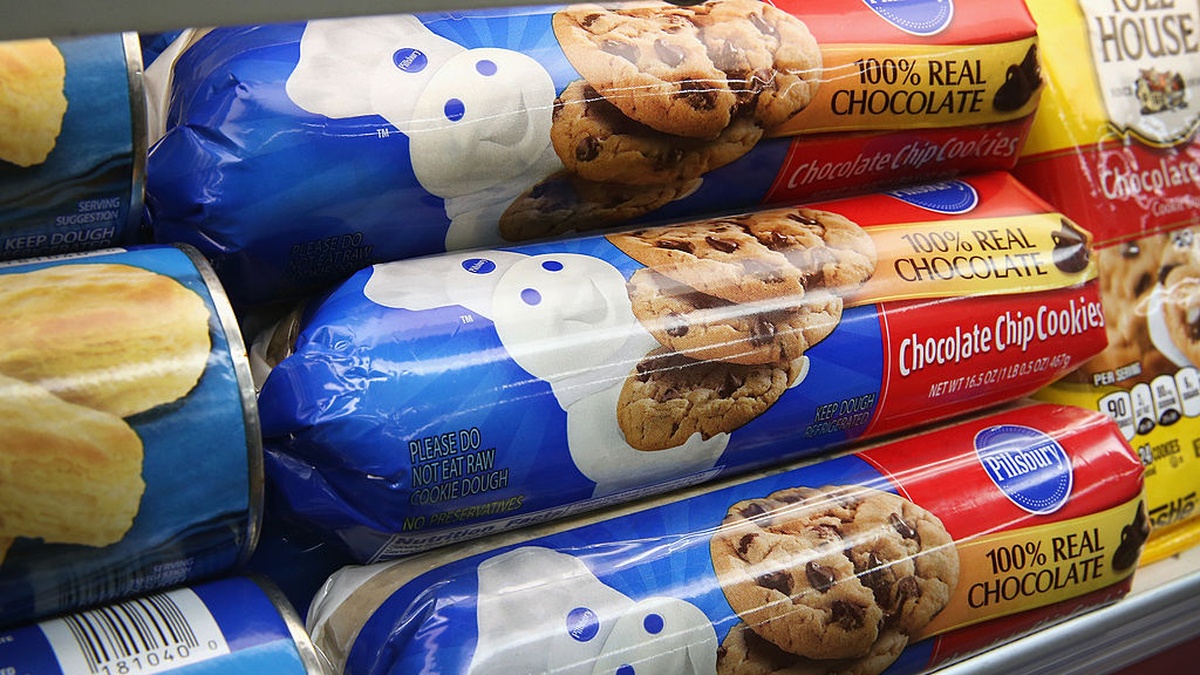
A woman from Massachusetts found tiny dark specks that look like aluminum all over her Pillsbury canned biscuits while making dinner for her family. Opening those classic canned biscuits is usually only scary because you have to pop the tube open, but TikTok content creator Marina (@marinathingz) quickly realized something was seriously wrong with her dough.
According to Bro Bible, she showed what she found in a viral TikTok video that has gotten more than 147,000 views, showing the unexpected problem she discovered in the normally plain beige dough. She talks about pulling the biscuits out and seeing “little pieces of aluminum in them.”
She zoomed in, and you can see the suspicious spots reflecting light. They look like dark gray or bluish flecks, which might match the color of the outer packaging. “What the heck? That’s, like, reflective. Ew. What the h**? It’s all over it,” she says in the video.
This wasn’t just one bad biscuit either
Marina wasn’t going to risk serving these to her family, which makes total sense. She confirmed that this wasn’t just a problem with one biscuit. Almost every piece showed contamination in different amounts. That’s a huge problem when you’re counting on a simple side dish. She made it clear she wasn’t going to eat them, saying, “Some of them, like, aren’t that bad, but what the f***? There’s tiny pieces of aluminum.”
Marina didn’t hold back about calling out the brand directly, questioning what they were doing. “Pillsbury Grand, you owe me $10,000,000 because why are you trying to poison me and my family?” she demanded.
She later added in the caption, “Welp @Pillsbury not sure we want aluminum in our biscuits.” Marina’s calm but firm response to the contamination mirrors how one woman handled a parking lot incident that could’ve escalated quickly.
The first thing you worry about when you see something metallic in your food is whether it’s toxic. But if you’re worried about small metal bits like this, the good news is that Poison Control says aluminum foil is generally non-toxic. Swallowing tiny pieces usually isn’t harmful, since aluminum foil is mostly aluminum with some iron and silicon mixed in.
However, you definitely don’t want to eat large pieces. Larger pieces can cause serious problems like blockages in the throat, lungs, or gut. While being exposed to massive amounts of aluminum over a long time can affect your bones and nervous system, small exposures once in a while typically aren’t considered dangerous. Still, nobody wants to eat reflective blue specks when they’re making dinner.
Confirmation that plastic was found in Pillsbury's biscuits back in 2001. Seems they didnt actually stop. Just altered it where you wouldn't know
— Truthseeker9879 (@Truthseeker9879) October 21, 2025
Apparently if you get a fresh one you'll never notice the little plastic in the dough. The plastic is made to be… https://t.co/CxSmTfNNfV
What makes this discovery especially concerning is that Pillsbury has a history of contamination problems. This isn’t their first time dealing with foreign objects getting into the dough or cereal. Back in 1971, glass shards were found in Farina cereal at their Minneapolis plant. Finding unexpected things where they shouldn’t be is always unsettling, much like when something strange appears on camera in places you thought were safe.
Decades later, in 2001, they had to voluntarily pull 30,000 cases of frozen biscuits off shelves because plastic shards were found in the dough, creating a potential choking hazard. Even more recently, in 2013, the company recalled two types of Cinnamon Rolls with Icing after a broken piece of plastic from the manufacturing plant somehow ended up in a batch.
 ew
ew 






